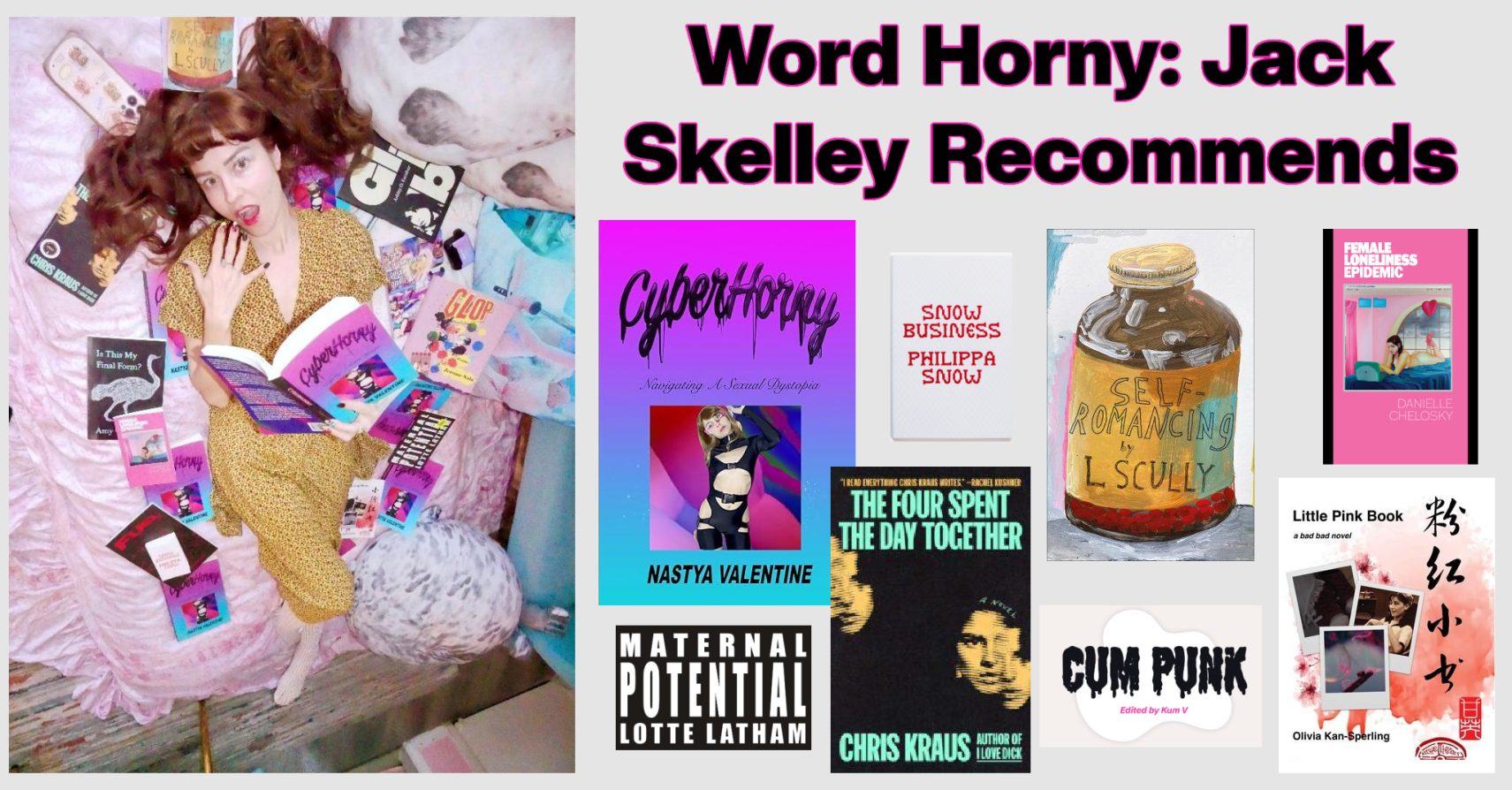
writer Nastya Valentine with books reviewed by Jack Skelley


Nastya Valentine – Cyberhorny: Navigating a Sexual Dystopia, and The Cyberhorny Dream Diaries: In Defense of e-Subjectivity (cyber-horny.com)
Earlier this year, a writer friend said to me, “You and Nastya should talk. Her new book is kind-of Myth Lab-adjacent.” This was in reference to my novel (subtitled Theories of Plastic Love, Far West press). Sure enough, both Cyberhorny and its Jungian appendix The Cyberhorny Dream Diaries orbit with my art obsessions in “the clitoverse” – the eroto-celestial plane where forces of pleasure defeat the denial of desire and warping of libido amid or despite algorithmically administered market controls. Cyberhorny and Myth Lab (which also share a purple/pink palette) overlap with influences high and low, esoteric and sticky, Lacanian and Lynchian. On one level, Cyberhorny is an online sex primer. You’ll learn a shit-ton about Only Fans. But watch it extrapolate through space and time. Scoff if you must, but Cyberhorny compares to the encyclopedic scope of Moby Dick or Urn Burial by Sir Thomas Browne – that free-range, 17th century compendium of paradoxical thought. Valentine exceeds limits of logic to glory in eromantic flights of consciousness.

Erin Robinson, XXX Machina
Not a book but an ongoing art/research project by Erin Robinson . XXX Machina disentangles then reknots the naughty algorithmic dimensions of porn and digital bodies. It matches up with fave theorists in this zone (Bataille, Baudrillard, Lacan, Deleuze) plus of course the seminal cyborg feminism of Donna Haraway (also Myth Lab-adjacent). Robinson and XXX Machina have upcoming exhibitions in Denmark and Northern Ireland.


Philippa Snow, Snow Business (Isolarii, 2025), and It’s Terrible the Thing I Have to do to Be Me (Virago, 2025)
Philippa Snow is our top, post-everything, pop-culture appraiser with super-empath powers, lovely hair and two new books. I discovered Snow’s writing in an essay about my dear friend Bob Flanagan. Although Bob, who died in 1996, is legendary for his severe SM performances, Snow discerned in Bob the hilarious poet I knew. Bam! I was hooked on Snow’s insights into icons. (The Flanagan piece appears in her 2022 collection, Which As You Know Means Violence.)
This year the author released two volumes from UK presses: Snow Business and It’s Terrible The Things I Have To Do To Be Me: On Femininity and Fame (I plan to nick her idea of long-ass titles for my next novel!). Snow’s empathy animates something we all experience but few articulate: We’re stuck in a love/hate relationship with mass media. In Snow Business, her bemusement meter even evolves into mini-fictions, inhabiting the psyches of stars in all their tawdry grandeur. This summer I interviewed Snow for Interview magazine: She in London, me in L.A.

Lotte Latham, Maternal Potential (Carrion Press, 2025)
Latham, like Snow, is based in London. Linguistically gifted, Latham caught attention with her 2023 memoir (Dear Mr. Andrews, Guts Publishing Ltd.) It charted the ins-and-outs of sugar dating across the hotels of Europe: the joys and the sads. In Maternal Potential, narrative gives way to wordplay bursts that verge on verse with this theme: losing a pregnancy… and the resulting disharmonious hormonal emotions. Plus, it links astute class awareness with dirty talk: “He counts to ten, spanking me for all the rent I didn’t pay. Then fucks my face quite roughly and I vomit red wine up. I took a photo of the red sick on the sheets – a menstrual stain.” The touching/funny tone makes you fall in love with Latham’s voice. Maternal Potential delivers mourning (sickness), wisdom and tart humor. It ponders motherhood in a world where love is commodified yet persists.

Chris Kraus, The Four Spent the Day Together (Scribner, 2025)
Speaking of loving dick, Chris Kraus has a new one. The Four Spent the Day Together takes a stab at true-crime. The murder doesn’t come until the book’s final third, but it shoots new juice into Kraus’ customary veiled memoir. Catt (a stand-in for Chris) consumes evidence surrounding a teen meth death in rural Minnesota where she has a home. The details are chilling. They would also be inexplicable except for Kraus’ deft – almost invisible – picture of the economic realities at play: These teens have no financial future. The wheels of capitalism also grind silently through the book’s other two sections: reflections on young Catt’s Connecticut roots and radicalization; and on the period when Kraus was a victim of canceling.
Supporting the book, Bel Ami gallery in Los Angeles created “Civil Commitment.” This is a vast collage of investigative material compiled by Kraus. I’ve seen it. It’s like one of those conspiracy theory memes, with interlocking photos and documents. Author/artist Juliana Halpert compellingly cross-references the Kraus research with photographs of Halpert’s mother’s work as a public defender. It’s another lens for uncomfortable conflicts rendered in the book.

Danielle Chelosky, Female Loneliness Epidemic (Far West, 2025)
Speaking of Chris Kraus, Danielle Chelosky entered my world with a request to forward her early chapbook to Kraus… who enjoyed it. Me too. Since then, Chelosky’s books have buffed-up into (Mary) Gaitskillian or (Lynn) Tillmanian tales of wayward fucking/romance. She even titled her recent series of NYC readings Weird Fucks, after Tillman’s early collection (which I devoured at the time I was writing Fear of Kathy Acker). The charm of Female Loneliness Epidemic is not in the stories per se, but the details and tone of angsty pleasure and compulsion. One line I circled: “He thought it was silly I liked to keep my underwear on during sex, pushed to the side. I didn’t want him to think it was silly. I wanted it to be sexy.” This tracks with a bolded, pleasure-dom line that climaxes the first paragraph of Fear of Kathy Acker: “Just leave your underwear on!” While Chelosky hits rich veins, she cultivates a personal iconography of White Claws, schoolgirl skirts and fishnets.

L Scully, Self-Romancing (Dopamine Books, 2025)
Step 1: Read Self-Romancing. Step 2: follow L Scully’s Insta for their near-daily sonnets. Step 3: Get inspired to make your own. Writing can be a self-cringing, existential quest: “Is this any good? Will anyone read it? I can’t go on. I’ll go on.” But L is fearless, banging out declamatory affirmations drenched in emotion and quotidian mini-dramas: “The love I fell in yesterday will carry me through a lonely evening.” Or “You didn’t say the sex addiction thing was either hot or even a red flag and that made me feel like a person.” To clarify: Self-Romancing is not sonnets, but page-length paragraphs. Still, many of the lines would transplant well to sonnets. Maybe I’ll steal the ones I quoted.

Jerome Sala, Glop (BlazeVOX, 2025)
It still mystifies me: Poetry, whose job is to train the weapons of language upon itself, often neglects pop culture. I mean, this is the air we breathe: movies, music, memes, news, sex, celebs, algorithms. And all of these – let’s face it: even our own personalities – are tools of advertising. That’s why the gods of commerce created the droll Jerome Sala: America’s premier pop poet. It took this Madison Avenue copywriter (now retired) to rebrand verse via the love/hate bonds of commodification. To see profundity in stupidity:
Which is why I stand before you now
proof of both
the glories of capitalism
and the truth
of dialectical materialism
Get Glop today!

Amy Gerstler, Is This My Final Form? (Penguin Poets, 2025)
Amy Gerstler is America’s greatest living lyric poet. There, I said it. A perfect example is this book’s “Night Herons,” which appeared also in The New Yorker and represents Gerstler’s specialty: the dramatic (comic) monolog. So, no surprise this volume also veers into dramatic works. (“Siren Island.”) I’ve seen her miraculous/weird plays rendered on stage. They’re a corollary pleasure on the page.

Rosie Stockton, Fuel (Nightboat, 2025)
There are (they say) two parts of a metaphor: The “tenor” (meaning) and the “vehicle” (the image that carries it). The verse of Fuel drives the vehicle of desire – literal and symbolic, internal and societal. In a Lit Hub essay Stockton compresses the book’s rich power poetics: “According to Lacan’s update to Freudian psychoanalysis, all drives operate at the speed of the death drive. The death drive is a mistaken longing for pre-Oedipal harmony that fuels the coherence of our symbolic order, mediating between life and death. But as every Orphic driver knows, this has more to do with our quest to cohere meaning in our symbolic worlds than biological instincts. For better or for worse, the drive is a series of detours that lets us speed toward and circle around the enjoyments of life that we, in a world that is literally running out of gas, don’t have the energy for. Not literally death, but the deadness we intercept driving close to the guardrails. The drive circuits around what keeps us alive, beyond mere self-preservation. The proof is in the poetry: the death drive, actually, is on the side of life.”

Olivia Kan-Sperling, Little Pink Book: A Bad Bad Novel (Archway Editions, 2025)
What is it? A meditation on a color. A bilingual fable. A confection of cuteness. A yummy gummy romance. A takedown of Asian girl-pop machinations. Little Pink Book is also something impossible: an exaltation of the power of “sentimental” melodies/lyrics. (Have you ever had a sappy song trigger a deep cry?) Pretty word-worlds cuddle you weirdly: “Having been injected into this bubble-gum bubble, Limei felt cold, slow, sticky. This usually sweet and nice shade – the color of girls and fun – felt, suddenly, claustrophobic. Pink was also the color of insides, and this was too much, too much inside.” Amid the mash of forms is narrative, complete with horny/porny parts. Is it all in little Limei’s mind? Kan-Sperling is a virtuosa of multiple styles.

Cum Punk
A gorgeously gooey online anthology, Cum Punk proclaims: “Cum is in-your-face life energy. We are here to blow loads and do big juicy squirts in the faces of sex neurosis, prudish pretension, and desire-dementing repression. Gone are the days of self-leaving, disembodied cums. Now is the time of fully embodied, self-arriving cums! We bust through fear and shame as hard as we bust our finest, most violent nuts.”

Ashley D. Escobar, GLIB (Changes Press)
The NY School of Poetry is in good hands… and mouths. Validating generational elasticity, Escobar’s Glib references Frank O’Hara, but instead of “i do this, i do that” it’s “i fuck this, i snort that.” Laffs and schemes and senses and dreams, and sexuationships, thick with references… totally IN THE MOMENT. Poetry is not ABOUT something; it IS that thing. “Thingness,” as Eileen Myles posits in the intro. Plus, any book that rags on Sally Rooney & includes lines like, “your dick is my favorite toy” gets extra points.

